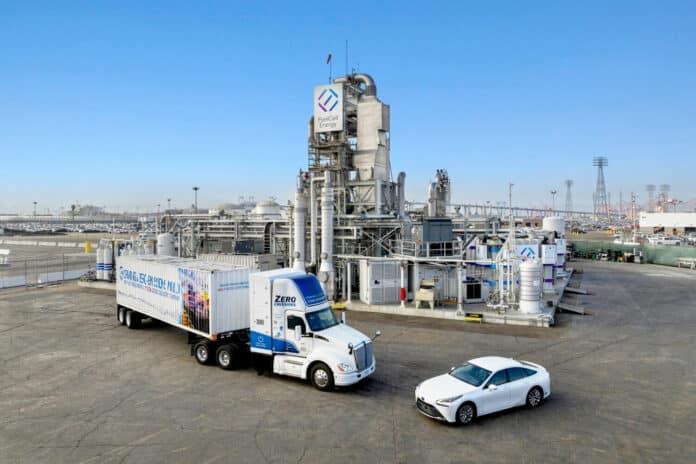FuelCell Energy and Toyota Motor North America have announced the completion of the world’s first Tri-gen system at Toyota’s Port of Long Beach operations. This system produces renewable electricity, hydrogen, and water from recycled biogas.
Tri-gen will enable Toyota Logistic Services (TLS) Long Beach to become the company’s first port vehicle processing facility globally, powered by onsite-generated, 100% renewable energy.
“By utilizing only renewable hydrogen and electricity production, TLS Long Beach will blaze a trail for our company,” said Chris Reynolds, Chief Administrative Officer, Toyota. “Working with FuelCell Energy, together we now have a world-class facility that will help Toyota achieve its carbon reduction efforts, and the great news is this real-world example can be duplicated in many parts of the globe.”
FuelCell Energy’s innovative fuel cell technology will support Toyota’s operations at the port through an electrochemical process that converts directed renewable biogas into electricity, hydrogen, and usable water with a highly efficient, combustion-free process that emits virtually no air pollutants.
To generate renewable energies, renewable biogas from organic waste is delivered to the site through the pipeline. Biogas contains methane that will be converted to hydrogen in a fuel cell stack. Then, the biogas is sprayed with water and humidified inside the saturator. Wetting the gas to an ideal water-to-methane ratio allows the steam in the fuel cell stack to be converted to hydrogen.
Exiting the 1000°F (537°C) fuel cell stack, it passes through tubes containing saturated gas, heating the wet gas for the steam-reforming process. A fuel cell steam reforms wet gas into hydrogen using heat and water as a byproduct of the electrochemical power generation process.
Direct current (DC) from the fuel cell is converted to alternating current (AC) at the appropriate voltage and frequency for delivery to the power grid or on-site use at nearby facilities.
The fuel gas exiting the fuel cell contains high amounts of hydrogen and water vapor. Cold air is blown over the tubes containing the gas, and the gas cools, so the vapor is liquidized as water and is removed from the gas. Water is recycled by the fuel cell, and excess water is sent to Toyota’s car washing stations. Hydrogen is purified to the level required by fuel cell electric vehicles (FCEVs). The purified hydrogen is then delivered to the hydrogen station dispensed to fuel zero-emission vehicles.
The high operating temperature of fuel cell systems improves power generation efficiency and delivers usable thermal waste heat. Thermal heat can also be used for metal processing, glass production, petrochemicals, material handling, etc.
Tri-gen generates approximately 2.3 MW of renewable electricity, up to 1,200 kg of hydrogen per day, and 1,400 gallons of water daily.
Renewable electricity produced by Tri-gen will be off-taken by TLS Long Beach to support its operations at the port, which processes approximately 200,000 new Toyota and Lexus vehicles annually.
Moreover, the FuelCell Energy Tri-gen system renewable hydrogen will provide for TLS Long Beach’s fuelling needs for its incoming light-duty fuel cell electric vehicle (FCEV) Mirai while also supplying hydrogen to the nearby heavy-duty hydrogen refueling station to support TLS logistics and drayage operations at the port. Hydrogen production can be ramped up and down based on the needs and requirements.
Co-produced water from Tri-Gen’s hydrogen production process will be used for car wash operations for vehicles arriving at the port before customer distribution by TLS Long Beach. This will help reduce the use of restricted local water supplies by approximately half a million gallons annually.
By supporting TLS operations at the Port of Long Beach, Tri-Gen’s carbon-neutral products are expected to reduce more than 9,000 tons of carbon emissions from the power grid annually.
Tri-gen will also help to avoid more than six tons of grid nitric oxide emissions, which are harmful to both people and the environment. Additionally, it can potentially reduce diesel consumption by more than 420,000 gallons per year by using hydrogen-powered fuel cell trucks in port operations.
“Renewable hydrogen is an important fuel for the future of the Port of Long Beach and the shipping industry,” said Port of Long Beach CEO Mario Cordero in a statement. “The renewable hydrogen generated by the ‘Tri-gen’ system that Toyota commissioned, and similar projects, is part of our multi-strategy approach to help fuel the transition of equipment like locomotives, harbor craft, cargo-handling equipment, and trucks to zero emissions.”
In addition, excess electricity not used by TLS will be delivered to the local utility, Southern California Edison, under the California Bioenergy Market Adjustment Tariff (BioMAT) program, adding a renewable, resilient, and affordable baseload electric generation resource to the electric grid.
The Tri-gen system is an example of FuelCell Energy’s ability to scale hydrogen-powered fuel cell technology, an increasingly important energy solution in global efforts to reduce carbon emissions.
The Tri-gen system is owned and operated by FuelCell Energy, and they have contracted with Toyota to supply the products of Tri-gen under a 20-year purchase agreement.
